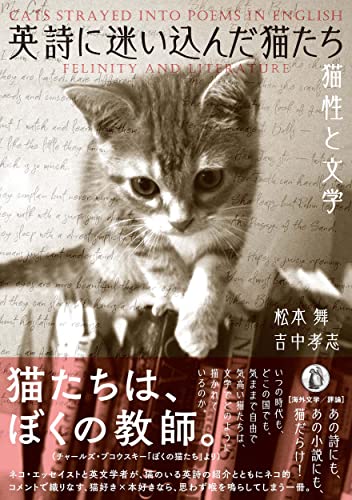8 0 0 0 IR 初期近代英詩における錬金術(中編)
- 著者
- 松本 舞
- 出版者
- 島根大学
- 雑誌
- 島根大学教育学部紀要. 教育科学・人文・社会科学・自然科学 (ISSN:18808581)
- 巻号頁・発行日
- vol.48, pp.55-63, 2014-12-25
前編では、まず、初期近代の英国詩人たちの表現を、錬金術の理論と照合させながら確認していった。錬金術によって取り出される第五元素の効果は、1650年代の錬金術復興運動の時期を経て変化していったこと、死からの復活を可能にするものとして錬金術が描かれていることに注目した。13; 本編では、トマス・ロッジの「錬金術の解剖」やエイブラハム・カウリーの「オード」の中で描かれる、錬金術師の表現をみていく。また、ベン・ジョンソンの戯曲『錬金術師』の中の錬金術の実験の行程や、錬金術をとりまく人々の描写を検証する。13; また、後編では、終末思想と錬金術の関係を明らかにしながら、ヘンリー・ヴォーンの詩の中の実践的錬金術の描写を清教徒の「新たなる光」('New Light')の概念に対する批判の視点から考察したいと考えている。
8 0 0 0 IR 初期近代英詩における錬金術(前編)
- 著者
- 松本 舞
- 出版者
- 島根大学
- 雑誌
- 島根大学教育学部紀要. 教育科学・人文・社会科学・自然科学 (ISSN:18808581)
- 巻号頁・発行日
- vol.47, pp.81-88, 2013-12-25
本論では、まず、初期近代の英国詩人たちの表現を、錬金術の理論と照合させながら確認していく。錬金術には、卑金属を金に変える、実践的錬金術のほかに、不老不死の薬を得ようとする、精神的錬金術があり、両方の錬金術が文学作品の中で描かれている。錬金術師は一種の詐欺師であると、皮肉を込められて描かれることが多いが、錬金術によって取り出される第五元素の効果は、1650年代の錬金術復興運動の時期を経て、変化していく。さらに本論では、死からの復活を可能にするものとして錬金術が描かれていることに注目する。後編では、終末思想と錬金術の関係を明らかにしながら、ヘンリー・ヴォーンの詩の中の実践的錬金術の描写を清教徒の「新たなる光」('New Light') の概念に対する批判の視点から見ていく。
7 0 0 0 ヘンリー・ヴォーンと賢者の石(中国四国英文学研究)
- 著者
- 松本 舞
- 出版者
- 一般財団法人日本英文学会
- 雑誌
- 英文学研究. 支部統合号 (ISSN:18837115)
- 巻号頁・発行日
- vol.4, pp.393-400, 2012-01-20
The aim of this paper is to examine Henry Vaughan's use of alchemical expressions through a close reading of Silex Scintillans (1650, 1655). Considering that a Rosicrucian manifesto, The Fame and Confession of the Fraternity of R: C: of Rosie Cross, was translated by Thomas Vaughan, Henry's twin brother, in 1652, the emblem attached to the first edition of Silex Scintillans should be read in the context of the movement of the alchemical renaissance. From the viewpoint of alchemy, the flashing flint of the title-page suggests the situation of a heart of stone waiting to be softened and cleansed by the power of fire, which represents God's sword. In this paper, I will reconsider Vaughan's emblem more in detail, by examining the meaning of God's light, the silex [Philosopher's stone], tears and blood in the context of alchemical writings. First of all, this paper argues that Vaughan's expression of light can be read as a strong condemnation of the 'New Light', of which Puritan boasted. Moreover, it shows that the theory of alchemy became so widely recognized that the Philosopher's stone was described as a form of medicine. In addition, tears and blood could symbolize the 'Quintessence'. As Paracelsus had argued, 'the reason why [the] Quintessence cures all disease' is because of its 'great cleannesse and purity'. Furthermore, Paracelsus also compares Christ to the Philosopher's stone. Vaughan, too, recognizes that not only is Christ the Good Physician, he is the Good Alchemist, as well. Moreover, the poet redefines the Passion of Christ as God's Alchemy and he attempts to gain some medical benefit from it. The paper concludes that, for Vaughan, the praise of God's Alchemy is a paradoxical criticism of the actions arising from the Puritans' religious corruption.
- 著者
- 松本 舞
- 出版者
- 一般財団法人日本英文学会
- 雑誌
- 英文学研究. 支部統合号 (ISSN:18837115)
- 巻号頁・発行日
- vol.2, pp.467-478, 2009-12-15
- 著者
- 松本 舞
- 出版者
- 広島大学文学研究科英文学会
- 雑誌
- Phoenix (ISSN:09112170)
- 巻号頁・発行日
- no.71, pp.1-9, 2011
- 著者
- 菅沼 大行 林 宏紀 松本 舞
- 出版者
- 公益社団法人 日本栄養・食糧学会
- 雑誌
- 日本栄養・食糧学会誌 (ISSN:02873516)
- 巻号頁・発行日
- vol.75, no.3, pp.97-102, 2022 (Released:2022-06-17)
- 参考文献数
- 23
カロテノイドは天然界に広く存在する色素であるが, 食事として摂取するものの起源は野菜や果実が多い。また, ヒトはカロテノイドを生合成することができず, 吸収された後, 種々の組織に分布する。我々は, カロテノイドの皮膚への蓄積を光学的に非侵襲で測定できるデバイスを用い, 野菜摂取量を簡便に見積もることができる装置を開発した。住民を対象とした国内の横断研究 (n=811;女性58%;平均年齢49.5±15.1歳) において, その測定値は, 野菜や果実の摂取量と相関することが知られている血清カロテノイド濃度および簡易型自記式食事歴法質問票 (BDHQ) から算出された野菜摂取量と有意な正の相関を示した (それぞれr=0.678, r=0.210)。また, 数値が高いほどメタボリックシンドロームと関連する複数の指標の測定値が健康的であることが示唆された。容易に測定できることから, 現在, 健診の現場等での活用が始まっている。
- 著者
- 松本 舞
- 出版者
- 日本英文学会
- 雑誌
- 大会proceedings
- 巻号頁・発行日
- vol.82, pp.53-55, 2010-05-29
1 0 0 0 IR 猫と文学 : その弐(英詩篇)
- 著者
- 松本 舞
- 出版者
- 広島大学表現技術プロジェクト研究センター
- 雑誌
- 表現技術研究
- 巻号頁・発行日
- no.14, pp.31-49, 2019-03-31
本論は、広島大学・徳島大学・山口大学主催の次世代研究者育成プログラム「未来を拓く地方協奏プラットフォーム」のラボ・ローテーションの一環として、コンソーシアム活動経費にて島根大学にて訪問研究を行った(平成28年10月から平成29年3月)成果の一部である。また、本論は、「本の学校」今井ブックセンターで開催された、第15 回「文藝学校」講演会における筆者の「あなたの知らない猫の世界 ―猫と英文学、猫とヒトの時空間」と題された講演(平成29 年7 月)及び、福岡県北九州市のラジオ局FMKITAQで筆者がパーソナリティを務めた「ネコと文学、ときどき音楽」(平成29年6-8月、全13 回)の番組の一部である。
1 0 0 0 IR 猫と文学 : その壱(ヨーロッパ篇)
- 著者
- 松本 舞
- 出版者
- 広島大学表現技術プロジェクト研究センター
- 雑誌
- 表現技術研究
- 巻号頁・発行日
- no.13, pp.1-21, 2018-03-31
本論は、広島大学・徳島大学・山口大学主催の次世代研究者育成プログラム「未来を拓く地方協奏プラットフォーム」のラボ・ローテーションの一環として、コンソーシアム活動経費にて島根大学にて訪問研究を行った(平成28年10月から平成29年3月)成果の一部である。
1 0 0 0 OA <論文>2. 1997年鹿児島県北西部地震による花崗岩斜面の崩壊の特徴
- 著者
- 松本 舞恵 下川 悦郎 地頭薗 隆
- 出版者
- 鹿児島大学
- 雑誌
- 鹿児島大学農学部演習林研究報告 (ISSN:13449362)
- 巻号頁・発行日
- vol.26, pp.9-21, 1998-12-25
1997年3月および5月に鹿児島県北西部で発生した一連の地震により斜面崩壊が多発した花崗岩地域を対象に, 斜面崩壊の空間的・時間的推移および植生との関係について検討した。得られた結果は以下の通りである。1) 地震と降雨により発生した崩壊には拡大崩壊と新規崩壊がみられた。2) 調査流域(約678ha)における崩壊地の個数と崩壊面積は, 地震発生約1年前の1996年3月5日時点で124個と2.31ha, 1997年3月26目地震後の4月25日時点で290個と6.18ha, 5月13日地震後の5月27目時点で543個と13.37ha, 梅雨後の8月24日時点で649個と18.11haと経時的に大きく増加した。3) 調査流域において斜面崩壊により生産された土砂量は, 地震発生約1年前の1996年3月5日時点で23100m^3,1997年3月26目地震後の4月25日時点で61800m^3,5月13目地震後の5月27日時点で133700m^3,梅雨後の8月24日時点で181100m^3であった。4) 斜面崩壊の発生は櫓生に強く支配され, 幼齢針葉樹林地で多数の崩壊が発生していることが認められた。
1 0 0 0 OA 4.1993年度鹿児島豪雨による斜面崩壊・土石流の分布と土砂生産
- 著者
- 地頭薗 隆 下川 悦郎 松本 舞恵 加藤 昭一 三浦 郁人
- 出版者
- 鹿児島大学
- 雑誌
- 鹿児島大学農学部演習林報告 (ISSN:03899454)
- 巻号頁・発行日
- vol.23, pp.33-54, 1995-10-20
鹿児島県は1993年幾度となく豪雨に見舞われた。これによって県内のあちこちで斜面崩壊・土石流による土砂災害が発生し,大きな被害がでた。8月6日の災害直後,鹿児島市とその北部域の垂直空中写真が撮影された。空中写真判読に基づき,斜面崩壊・土石流の発生分布とそれによる侵食土砂量について解析を行った。得られた結果をまとめると次のようである。1)空中写真判読区域(南北方向20.6km×東西方向15.8km,面積約325km^2)に発生した斜面崩壊・土石流は大小合わせて6,500個以上にのぼった。それらの約60%は侵食域の面積が300m^2未満のものである。2)斜面崩壊・土石流による侵食域分布図に200m間隔でメッシュをかけ,200×200mグリッド内の斜面崩壊・土石流の個数を求めた。グリッド総数8,137個のうちグリッド内に斜面崩壊・土石流が1箇所以上存在するものは全体の約26%に相当した。斜面崩壊・土石流が10個以上存在するグリッドは甲突川中流域および思川中流域に集中している。3)空中写真判読区域を5区域に区分し,それぞれの区域の斜面崩壊・土石流による侵食域の面積を求めた。さらに,侵食域面積に平均的な侵食深を乗じて各区域の侵食土砂量を計算した。8月1〜2日豪雨で約1,600箇所の斜面崩壊・土石流が発生した思川流域では約500×103m^2(約8,000m^3/km^2)の土砂が侵食された。8月6日豪雨で約3,700箇所の斜面崩壊・土石流が発生した甲突川流域では約655×10^3m^3(約6,000m^3/km^2)の土砂が侵食されている。また多くの死者やJR日豊本線,国道10号の大きな被害が発生した姶良カルデラの西壁でも約55×10^3m^3(約7,000m^3/km^2)の土砂が侵食されている。4)空中写真判読区域を表層地質で大まかに3区域に区分し,それぞれの区域の斜面崩壊・土石流による侵食域の面積,土砂量を計算した。その結果,火砕流堆積物の非溶結部であるしらす区域で約942×10^3m^3(約5,OOOm^3/km^2),火成岩類区域で約224×10^3m^3(約3,O00m^3/km^2),堆積層区域で約202×10^3m^3(約4,O00m^3/km^2)であった。


